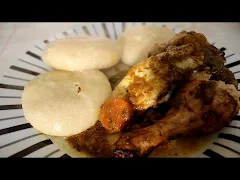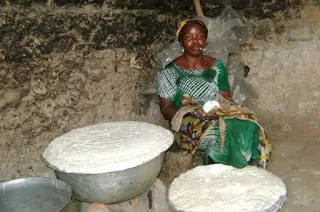Botswana Madombi Traditional Dumplings

African recipes by African Gourmet
Madombi are slightly sweet boiled dumplings served with Botswanan sauces, soups and stews.
Prep time: 20 min
Cook time: 30 min
Total time: 50 min
Ingredients
2 cups all-purpose flour
½ teaspoon salt
1 tablespoon white sugar
¼ teaspoon baking soda
Water for mixing
Water for boiling
2 tablespoons of oil
1 teaspoon of salt
Directions
In a large pot on high heat fill the pot halfway with water and add two tablespoons of oil and one teaspoon of salt.
For the dough
Add all the dry ingredients and mix well. Slowly add water into the mixture until dough is formed. Dough should not be sticky. Make even size balls of dough and slightly flatten. One trick is to make an indentation in the middle of the flattened dough ball with your finger in order for the dumpling to cook faster. Carefully drop the dough into the boiling water cook 25-30 minutes serve with any Botswanan soup or stew meal.
More economical easy lunch and dinner recipes to make right now so you never have to eat or prepare a boring meal again.
- Curried Tanzanian Coconut Okra Recipe
- Yedoro Stir Fried Ethiopian Chicken Dinner
- Senegalese Chicken Vermicelli
- Caldo Verde Portuguese Kale Soup
- Air Fryer Black Eyed Pea Dumpling Stew



























